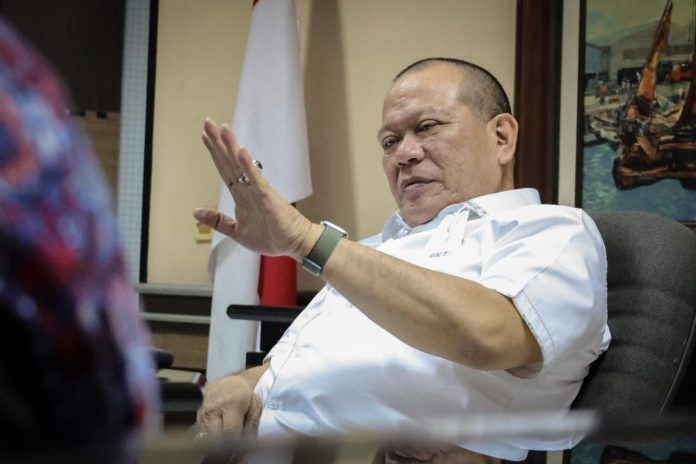SUBANG – Chairman of Indonesian Regional Representative Council (DPD RI) AA LaNyalla Mahmud Mattalitti talked about the issue of the Jakarta Special Region and the industrial-based maritime axis virtually at the Bahtsul Masa’il Kubro forum organised by the Bahtsul Masail Institute (LBM) of the Regional Leadership of Nahdlatul Ulama (PWNU) of West Java Province held at Dayang Sumbi Hall Sari Ater Resort & Hotel Subang, Tuesday (7/5/2024).
At the event themed ‘Polemics of Special Autonomy for the Special Regional Government of Jakarta and the Industrial-Based Maritime Axis’, LaNyalla assessed that Jakarta’s position after no longer being the State Capital was important to discuss.
The senator from East Java said, in general, there are three reasons why Jakarta became a special region.
“First, Jakarta has a position as the centre of the national economy. Second, Jakarta will become a global city, and third, because Jakarta is an agglomeration area, which is supported by Bogor Regency, Tangerang Regency, Bekasi Regency, Cianjur Regency, Bogor City, Depok City, Tangerang City, South Tangerang City, and Bekasi City,” he explained.
The senator hopes that the Bahtsul Masa’il participants can explore the academic texts and contents of the Jakarta Special Region Law.
“So the West Java PWNU LBM can produce the right decision, as well as recommendations for these public policies,” he said.
On the other hand, related to the industry-based maritime axis, LaNyalla assessed that there are five pillars of maritime policy that should be the basis for Indonesia to become the world’s maritime axis.
“The five pillars of maritime policy are maritime culture, maritime resources, maritime infrastructure and connectivity, maritime diplomacy, and maritime defense,” he explained.
According to him, these things are important to examine whether the five pillars have become Indonesia’s maritime development roadmap or not as the state revenue in the maritime sector is still low.
On the same occasion, Special Staff of the Chairman of DPD RI Sefdin Syaifudin who was present at the venue and became a speaker with a different theme, described the importance of popular sovereignty, Pancasila, and global challenges faced by Indonesia.
According to him, popular sovereignty and Pancasila are two important things in facing global challenges.
He explained that, in the state system as formulated by the founding fathers based on the original text of the 1945 Constitution dated 18 August 1945, this nation has a Supreme State Institution which is the embodiment of all elements of the people.
The institution consists of the elected DPR as well as regional and group elements.
That way, he continued, the Indonesian democratic system becomes a complete and sufficient system, without anyone being left out as all elements of the people are represented in the Supreme State Institution.
He believes that the state will be sovereign over public goods, so that the fiscal is fully supported by PNBP, not taxes and royalties. It also prioritizes the welfare economy and togetherness, where cooperation between public and private involves people, through cooperatives or community-based.
In the context of global life, Sefdin assessed that Indonesia faces tough challenges as the world is currently facing disruptions.
“There are two. The first is the technological revolution, which includes industrial automation, artificial intelligence, and artificial general intelligence. The second is climate change, where there are threats of natural disasters, threats of pandemic diseases, and threats to food security,” he explained.
Therefore, a very serious mitigation is needed through strengthening state sovereignty and a state model that is in accordance with the character and identity of the nation.
“So, this nation and state must return to Pancasila and the original 1945 Constitution to be further refined by addendum techniques,” said Sefdin.
Present at the event were Rois Syuriah PBNU Kiai Muhammad Musthofa Aqiel, Rois Syuriah PWNU West Java Kiai Abun Bunyamin, Chairman of Tanfidziyah PWNU West Java Kiai Juhadi Muhammad, Raja LAK Galuh Pakuan RM Evi Silviadi, Chairman of LBM PWNU West Java Kiai Zaenal Mufid, Prof Cecep Darmawan from UPI, and a number of other invited guests.




